The modern version of an African-American spiritual has helped draw together people who are fighting for justice.
-
Fall 2017
Volume62Issue5
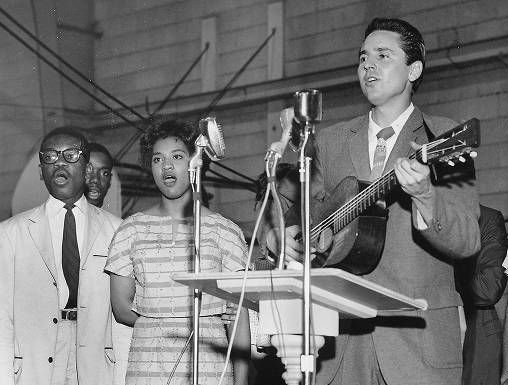
In April 1960, 126 young civil rights activists joined together in song in Raleigh, N.C., as they gathered for the founding of the Student Non-Violent Coordinating Committee, better known as SNCC. “Guy,” someone shouted, “Teach us all ‘We Shall Overcome.’”
Many of the volunteers had met the folksinger Guy Carawan five weeks earlier at a workshop on “Singing in the Movement” at the Highlander Folk School in Tennessee. Joined there by banjo-player Pete Seeger, Carawan and the group had sung numerous fast and slow protest songs that would come to be repeated over and over as the civil-rights struggle gained momentum. But it had been a new version of an old African-American spiritual that Seeger crafted that had been the highlight of the weekend.
Carawan had learned “We Shall Overcome” earlier, but most of the 70 participants at the Highlander school were hearing it for the first time. Now, at the SNCC founding convention, they wanted to sing it again. Its simple words and music would go on to become the anthem of the civil-rights movement, sung at rallies and marches, and even in jails. When the movement for racial equality lost steam in the next decade, it became the marching song in battles for freedom around the world.
How that happened reminds us that music has long been intertwined with protest. It has had an impact that has helped reform movements succeed. Growing out of slavery, adopted in black churches at the turn of the 20th century, picked up by laborers striking for better working conditions and then by civil-rights marchers, throughout its long history “We Shall Overcome” has helped draw together people fighting for a better life.
The song, with its promise “We shall overcome some day,” probably dates back to antebellum days, when slaves sang phrases such as “I’ll be all right someday” as they worked in the fields. Much of their music had roots in African songs brought over during the brutal Middle Passage to the New World. The patterns of call-and-response and repetition provided a sense of community and participation in a hostile and forbidding world, as well as an outlet for ideas about freedom that could not otherwise be voiced.
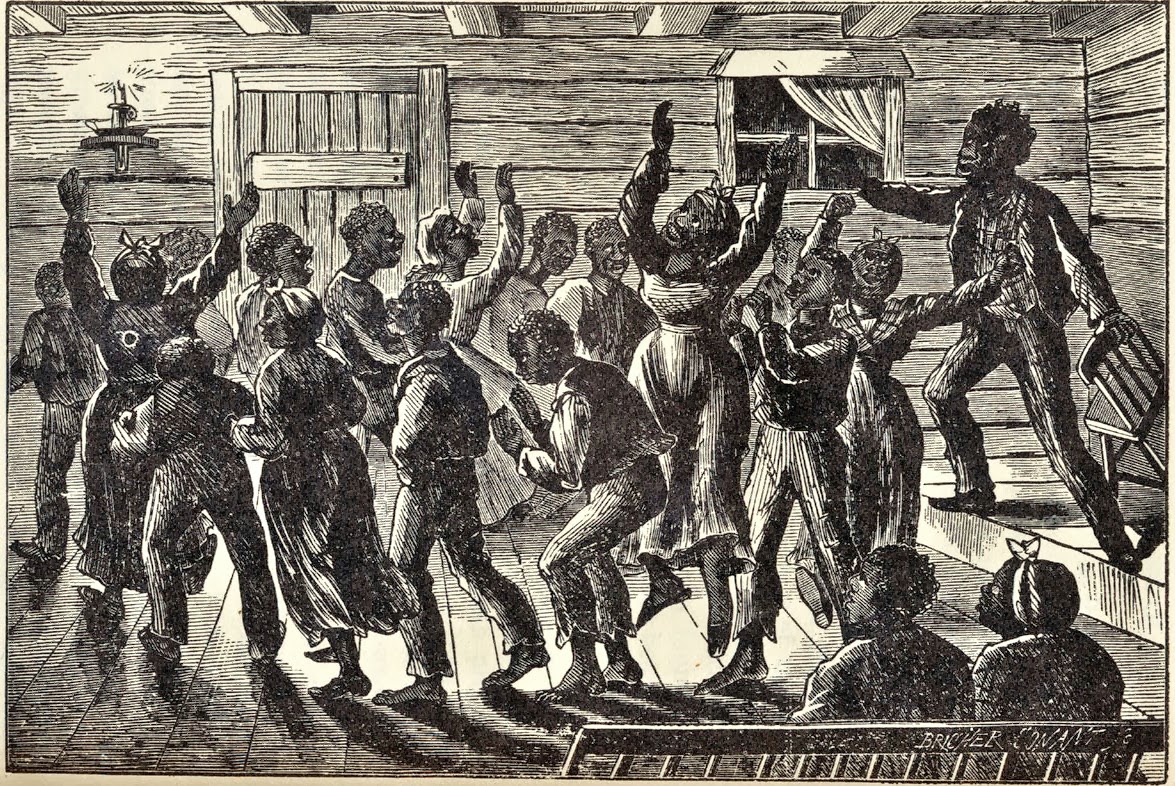
The life of slaves was relentlessly hard, and music was one of the few things that made it tolerable. Music was sacred to slaves, whether sung in church or in the fields.
Much of it persisted in the decades following the Civil War, particularly as Reconstruction came to an end and white Southerners established the Jim Crow laws of racial segregation that would persist for years to come. As state mandates of “separate but equal” in public facilities became the law of the land with the U. S. Supreme Court’s 1896 decision Plessy v. Ferguson, upholding segregation in the nation’s schools, music continued to provide an outlet, a sense of hope, and a dream for a better day, even as living and working conditions sometimes seemed little better than they had been during the slavery.
Music was a crucial part of church life, and in 1901, the Reverend Charles Albert Tindley, a Methodist Episcopal minister, published “I’ll Overcome Someday.” Born of slave parents in 1851, Tindley was an accomplished songwriter and author of such gospel hyms as “We’ll Understand It By and By.” In “I’ll Overcome Someday,” he drew on the biblical verse from Galatians 6:9, which promised early Christians that good deeds would someday bring rewards. Tindley’s song included the line, “If in my heart I do not yield, I’ll overcome some day.” Set to Tindley’s own melody, in time the song came to follow other tunes, particularly one from the old slave spiritual “I’ll Be All Right,” which itself drew on the 18th-century European hymn “O Sanctissima.”
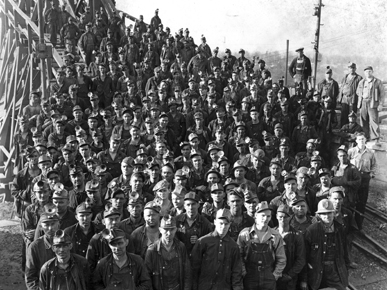
Tindley’s song found its way into the early 20th-century labor movement. Songs about work and the work experience were common in the colonial period and extended into the throes of industrialization when union organizers saw songs as a way to foster labor solidarity and fuel passion on the picket line – and convey a radical political message. Workers in some regions had more of a musical tradition than others, and the South was particularly fertile ground.
Protest music could be heard in Birmingham, Alabama in 1908. When coal-mine operators there tried to cut wages, more than 10,000 black and white workers belonging to District 20 of the United Mine Workers staged a two-month strike. Although ultimately unsuccessful, one observer, William Leach of Cordova, Alabama, noted that during the strike “the Empire local met every day, 351 strong – open air exercises, with prayer – and that good old song was sung at every meeting, ‘We Will Overcome Some Day.’” Leach went on: “Dear Brothers, let us not drop that old song, but still sing it. If we stick together, we will overcome some day...”
Four decades later, that same song echoed in another Southern strike. In October 1945, a thousand black and white workers at the American Tobacco Company in Charlestown, South Carolina, struck for higher pay and better working conditions. For five months, Lucille Simmons, a black worker with a lovely alto voice, led workers each night in song. “I Will Overcome,” they sang as they sought to keep up their spirits and maintain morale. And as they sang, they added new verses, such as “We will win our rights,” and “We will win this fight.” In the end, they won modest concessions and returned to work.
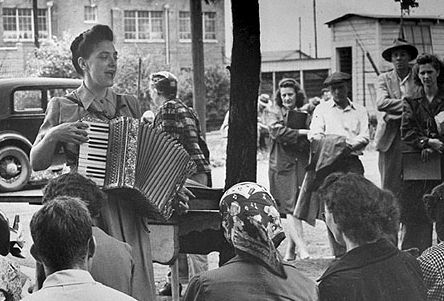
Subsequently, several participants in the strike, including a woman named Anna Lee Bonneau, traveled to the Highlander Folk School in southeastern Tennessee. Established in 1932, Highlander was a training center for Southern industrial and farm laborers, and a meeting place for black and white civil-rights activists. The co-founder Miles Horton had studied with the theologian Reinhold Niebuhr at Union Theological Seminary in New York City. His wife, Zilphia Horton, was deeply committed to music and made it a part of the Highlander curriculum. When she learned “We Will Overcome” from the tobacco workers, she taught it to all the civil-rights and labor activists who came through the school. In the late 1940s, she told a group of Montana farmworkers, “This is the song of ‘We Will Overcome’ – it’s a spiritual. I sang it with many different nationality groups. And it’s so simple, and the idea’s so sincere, that it doesn’t matter that it comes from the tobacco workers. When I sing it to people, it becomes their song.”
One of those who learned the song from Zilphia was Pete Seeger. Horton had gone to New York City on a fundraising trip in 1947, and there she sang the song for Seeger, whom she knew from an earlier visit he had made to Highlander. Seeger was a lanky musician who had worked with the folklorist Alan Lomax at the Archive of American Folk Song at the Library of Congress in the 1930s, had traveled out West in 1940 with Woody Guthrie, the legendary folksinger seven years his senior, and had then sung with a ramshackle group known as the Almanac Singers before being drafted. After service during World War II, where he entertained American troops with his banjo on the island of Saipan, he returned home and helped form an organization called People’s Songs, dedicated to spreading folk music around the country and around the world. Music was his passion, and he wanted people to sing together. Years later, he observed, “I’m proudest of all that I’ve been able to be a kind of a link in a chain for a lot of people to learn some good songs.”
Seeger liked the song Zilphia taught him, and the way she sang it. “She had a beautiful alto voice and sang it with no rhythm,” he said. But to make it more accessible, he changed it a bit. “I gave it a kind of ump-chinka, ump-chinka, ump-chinka, ump-chinka, ump-chinka, ump,” he said. “It was medium slow as I sang it, but the banjo kept a steady rhythm going.” He taught it to an audience at Carnegie Hall that year, and the following year he published it in People’s Songs, the magazine of the group he had helped form, with the title “We Will Overcome.”
The introduction in People’s Songs called it a “simple and moving hymn tune.” It noted the song’s impact in the labor struggle, and then quoted Zilphia Horton as saying: “It’s strong emotional appeal and simple dignity never fails to hit people. It sort of stops them cold silent.” The text then printed the first verse:
We will overcome
We will overcome
We will overcome some day
Oh, Down in my heart, I do believe
We’ll overcome some day
After that, it included two other verses – “The Lord will see us through” and “We’re on to victory” – and then it noted a repeat of the first verse.
The song undoubtedly drew on a variety of influences in addition to Charles Tindley. A gospel hymn called “If My Jesus Wills” composed by an African-American Baptist choir director named Louise Shropshire in the early 1930s, then published in 1942 and finally copyrighted in 1954, had lyrics that carried a similar message:
I’ll Overcome, I’ll Overcome, I’ll Overcome Someday
If My Jesus Wills, I Do Believe, I’ll Overcome Someday
Shropshire may well have shared “If My Jesus Wills” with Zilphia Horton, as she was beginning to teach the song she loved to others.
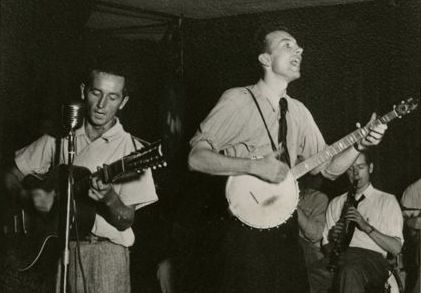
The song also went through a number of other changes in those early years. Perhaps the most significant was the shift Seeger made from “We Will Overcome” to “We Shall Overcome.” Inconsequential as that change seemed, it made a difference. Seeger, a Harvard dropout, cited his wife Toshi as he reflected on the shift. “Toshi kids me that it was my Harvard grammar,” he later recalled, “but I think I liked a more open sound; ‘We will’ has alliteration to it, but ‘We shall’ opens the mouth wider; the ‘i’ in ‘will’ is not an easy vowel to sing well.”
At the same time, Seeger also added verses to Ziplhia’s version starting with the lines “We’ll walk hand in hand” and “The whole wide world around”– just as she had done. Still another change involved settling on the word “We” rather than “I,” particularly as people sang it in different ways. Though Seeger sometimes received credit for that change, he attributed it to Septima Clark, an African-American educator and civil-rights activist from South Carolina. “We” seemed to give a song a more universal and collective appeal.
Over the next few years, the song began to be recorded. In 1950, the Congress of Industrial Organizations’s Department of Education and released an album called Eight New Songs for Labor which included “We Will Overcome.” Joe Glazer, known as “Labor’s Troubador,” taught the song to country singer Bill Strength, who recorded a version himself. Two years later, in 1952, a recording used the phrase “We Shall Overcome” rather than “We Will Overcome.” It featured Laura Duncan as soloist, with The Jewish Young Singers as chorus, and identified the song as “a Negro Spiritual.”
Frank Hamilton, a young folk singer from California, picked up Seeger’s version of the song. Hamilton was a member of People’s Songs, and later became part of the Weavers, the enormously popular folk group that Seeger helped form in the 1950s but had left by the time Hamilton joined. Hamilton added guitar chords to the song, which he taught to Guy Carawan, a musically-inclined graduate student finishing up a Master’s degree at the University of California, Los Angeles and traveling with him and Jack Elliot, another folk singer, throughout the South, collecting songs and singing to support themselves. Seeger had suggested the three men stop at Highlander, and there they would have heard Zilphia sing the song.
Seeger himself returned to Highlander a few years later, in 1957, and sang to an audience that included Martin Luther King, Jr., the young African-American Baptist minister who had become the most visible civil rights leader in the United States. King had led the successful Montgomery bus boycott, prompted by the refusal of Rosa Parks, trained at Highlander, to move to the back of the bus as directed by the driver a few years before. Driving to another engagement in Kentucky the day after he heard Seeger sing, he observed, “The song really sticks with you, doesn’t it?”
Carawan returned to Highlander in 1959, after Zilphia Horton had died. Because he had musical skills and could sing, he filled a gap stemming from Zilphia’s death. As music director, he reintroduced “We Shall Overcome,” playing it with the guitar chords he had learned from Hamilton.
Carawan organized the 1960 weekend event at Highlander for students involved with the sit-ins that were taking place in Nashville, Tennessee, Greensboro, North Carolina, and other cities throughout the South. Students protesting segregation sat down at lunch counters, normally off limits to black people, and refused to leave until served, even if that meant being arrested and going to jail. Candie Anderson, a student from Pomona College in California, studying as an exchange students at black Fisk University in Nashville, was one of the participants there. One of the first white students to participate in the sit-ins, she reflected on what went on that weekend: “Guy was there trying to find out what songs we were using as part of our demonstrations – and mostly we didn’t have a lot of songs,” she said. “He taught us a number of songs that weekend, and one of them was ‘We Shall Overcome.’ And I can remember this electrifying feeling when we heard it, that that song just said exactly what we were doing and what we were feeling.”
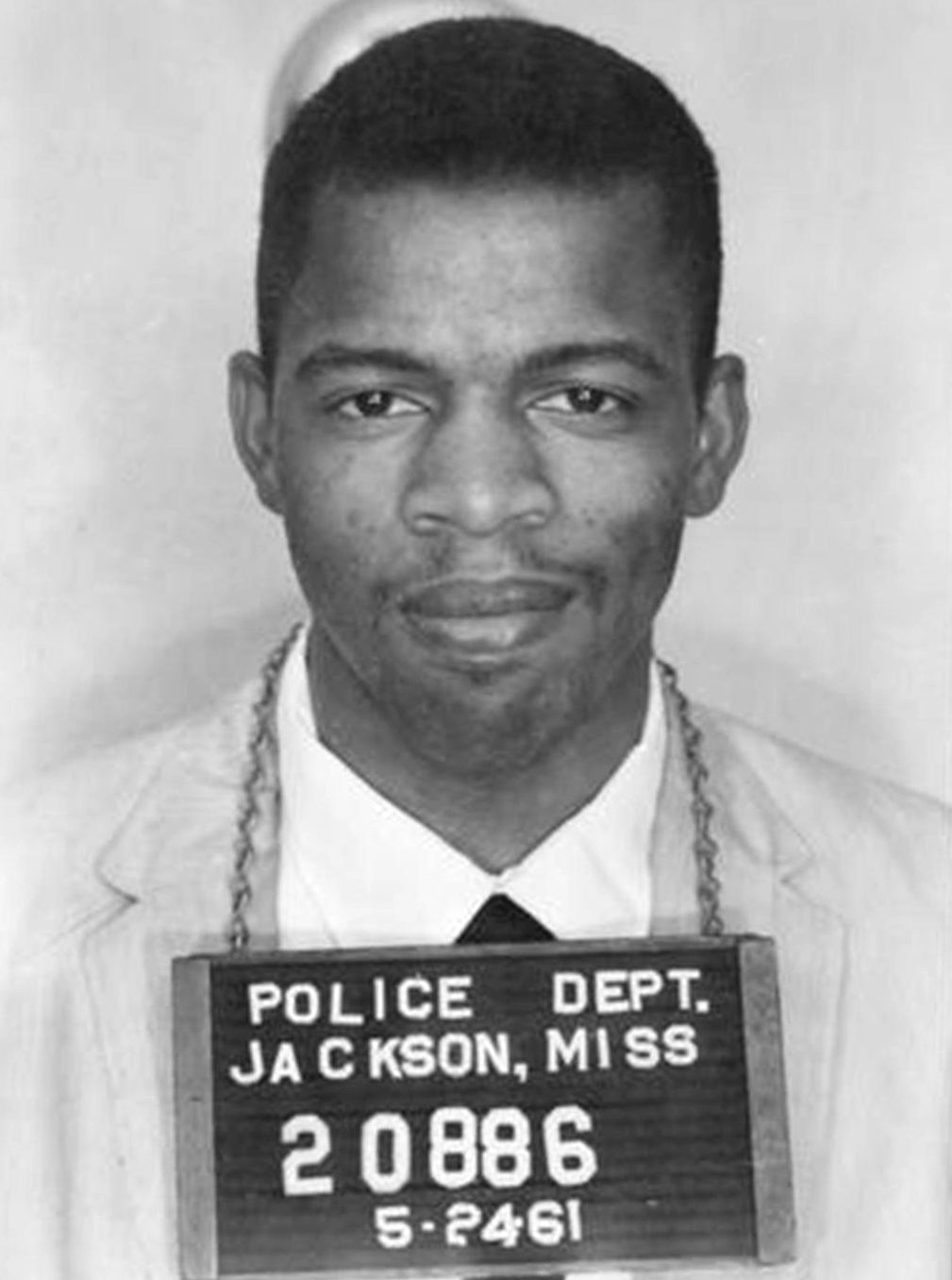
Five weeks later, at the SNCC founding convention, as Carawan, accompanying himself on the guitar, sang “We Shall Overcome,” the delegates rose from their seats, linked arms, and sang together. Carawan later noted that as the song caught on that weekend, “at a certain point, those young singers, who knew a lot of a cappella styles,… said: ‘Lay that guitar down, boy. We can do this song better.’ And they put that sort of triplet to it and sang it a cappella with all those harmonies. It had a way of rendering it in a style that some very powerful young singers got behind and spread.”
A copyright filing in the early 1960s listed no known author for a work entitled “I’ll Overcome” but attributed the revised version to Zilphia Horton, Guy Carawan, Frank Hamilton, and Pete Seeger. Seeger observed that the filing was to protect the changed song and to prevent anyone else from claiming authorship for personal gain, and noted that royalties went to a fund, administered by Highlander, to support the cultural expression of African-Americans in the South.
Meanwhile, music became a powerful part of the civil-rights movement. As John Lewis, a SNCC activist and later a member of the U.S. Congress, said later, “The civil rights movement without its music would have been like a bird without its wings.” In 1962, Robert Shelton, the noted music critic for The New York Times, wrote in a headline, “Songs a Weapon in Rights Battle.” The article went on, “Negro folk music, which has been singing of a promised land since the days of slavery, has become a vital force in the attempt to fulfil that promise in the South today.” Bernice Johnson Reagon, a noted singer herself, observed that songs were “the language that focused the energy of the people who filled the streets and roads of the South during that period.” Music helped quell fear. An official of the National Association for the Advancement of Colored People declared that, in the face of fear, “Music did what prayer and speeches could not do in breaking the ice.”
It had a place in every gathering. Songs reflected the universal values of the movement. They encouraged group participation and fostered a sense of common purpose. And they conveyed a powerful sense of hope. Seeger was particularly fond of an old gospel song “Oh, Mary, Don’t You Weep,” with its chorus line “Pharaoh’s army got drownded” and its pulsating beat. Carawan revived the song “Follow the Drinking Gourd,” with its sense of the way to a better life, and, over and over, people sang “Keep Your Eyes on the Prize, Hold On,” I’m Gonna Sit at the Welcome Table,” and a host of other songs dating back to the past.
But “We Shall Overcome” was the most special. The group the Freedom Singers was instrumental in spreading it around the country. The singers had begun as a student quartet in 1962 at Albany State College in Georgia. Seeger was taken by the energy of 19-year-old Bernice Johnson, who together with Cordell Reagon, whom she later married, and two other singers, made up the Freedom Singers. At the urging of Pete and Toshi Seeger, they dropped out of school; Toshi organized an extensive national tour, at which they sang songs like “We Shall Overcome.” Cordell Reagon, helped establish “we” rather than “I” as the best way to sing the song and taught audiences to rise, cross their arms, and hold hands as they sang.
Seeger himself did his part to spread the song. As part of a major assault on segregation in Albany, Georgia, where he struggled to get a church congregation to respond, he fell back on “We Shall Overcome.” It got everyone involved. Before Seeger left with his family on an around-the-world trip, he gave a concert at Carnegie Hall in New York City in mid-1963, and the album, recorded live, that came out of the concert was called “We Shall Overcome.” On his return, when he was in Meridian, Mississippi and word came that the bodies of 3 civil-rights workers – Michael Schwerner, Andrew Goodman, and James Chaney – had been found, he ended his program by telling the audience, “We must sing ‘We Shall Overcome’ now. The three boys would not have wanted us to weep, but sing and understand this song.”
People sang the song at the movement’s sit-ins. They sang it in Birmingham, Alabama, in the effort to desegregate the city in the face of snarling police dogs and high-pressure fire hoses. They sang it in Montgomery and Selma, Alabama, as they struggled to build support for passage of a voting-rights bill in Congress. When John Lewis’s skull was fractured on a day known as “Bloody Sunday” in Selma, he said “We Shall Overcome” sustained him. Pete and Toshi Seeger invited the Freedom Singers to the Newport Folk Festival in 1963, and the program closed with all performers on stage singing “We Shall Overcome.” That same year, at the March on Washington, the folksinger Joan Baez sang it with a chorus of the 300,000 participants.
The song became part of the popular vernacular. President Lyndon Johnson used the phrase “We shall overcome” in a nationally televised address to Congress in early 1965, to demand passage of a voting-rights act after the freedom march from Selma to Montgomery turned violent. “It is the effort of American Negroes to secure for themselves the full blessings of American life,” he said. “Their struggle must be our cause, too, because it’s not just Negroes, but really, it’s all of us who must overcome the crippling legacy of bigotry and injustice. And we shall overcome.” Martin Luther King, Jr., used the words in his final sermon in Memphis in 1968, just before his assassination. And they echoed several days later in the singing of the 50,000 people at his funeral.
Meanwhile, “We Shall Overcome” had begun to spread around the world. On his around-the-world trip, Seeger wanted to show the universal appeal of American songs to people on all continents. He had faith that his music could promote change not only in the United States but also around the globe.
The song became a signature in every country where he stopped, and it had a powerful reception. In Calcutta, India, 20,000 people came to hear him, with a nationwide radio audience estimated to be the size of the entire American population, and he sang, according to the New Delhi Statesman, with “a fervor that is almost evangelical.” Africa, exciting with its wonderful wildlife and memorable moments, often proved challenging. In Dar es Salaam, Tanzania, he sang at a graduation ceremony in a ballroom without a microphone. Though he feared it would likely lead to laryngitis, he recalled it was worth it when “We Shall Overcome” set the audience ablaze with delight. He always knew “when that marvelous moment comes – the ‘click’ of singer and listener – when I have really found my audience and it has found me.” He sang it all over Russia, and in Thailand, Korea, and Sweden, and other nations. Altogether, the trip took Seeger to more than 25 countries and had the impact he wanted.
As people around the world watched the struggle for equality unfold in the United States and embarked on their own fights for freedom, they appropriated the music that had galvanized the American movement. Roman Catholics in Northern Ireland sang “We Shall Overcome” in 1968 as they demanded equal rights in their fight against the Protestant majority. When Chinese students rebelled against the repressive Communist regime and sought to promote democracy at Tiananmen Square in June 1989, the song appeared on headbands and T-shirts, even as the tanks rolled across the plaza and quelled the protest. In Prague, that same year, during the demonstrations that were part of the “Velvet Revolution” against Soviet domination, hundreds of thousands of people in Wenceslas Square sang it, in both Czech and English, emphasizing the phrase “I do believe” in particular. In the South African struggle against apartheid, Bishop Desmond Tutu, who would later win the Nobel Peace Prize, used the song to try to help people in the United States understand what his country was experiencing in the painful effort to overturn the oppressive racist regime. And the list goes on.
In 2000, National Public Radio (NPR) included “We Shall Overcome” among the 100 most important musical works of the 20th century. Throughout its history, it has invoked the power of God. It has counseled people to maintain their hope for a better world ahead, in this life and not the next. As Lewis observed, “It gave you a sense of faith, a sense of strength, to continue to struggle, to continue to push on. And you would lose your sense of fear. You were prepared to march into hell’s fire.” The song has kept people focused on their struggles against discrimination. It has crystallized their issues and created a sense of community and shared experience. And it continues to resonate today.

